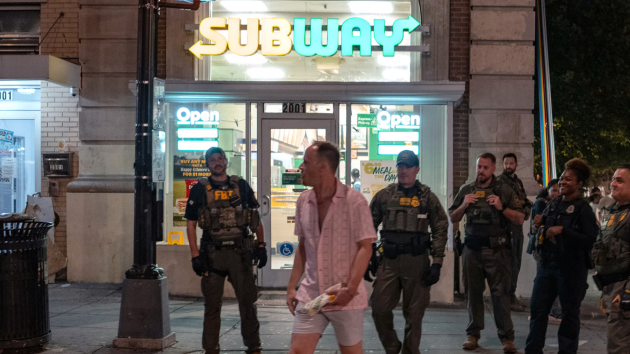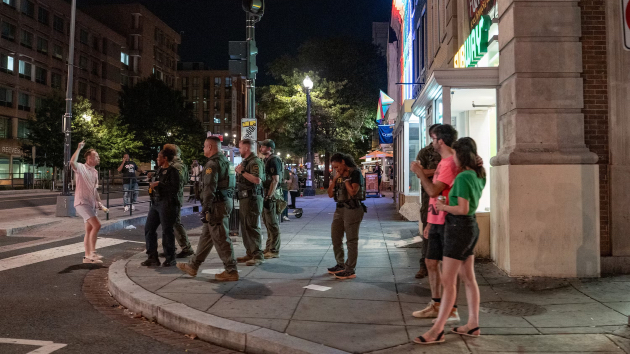Children, schools face renewed fears over heightened immigration enforcement
Written by ABC Audio ALL RIGHTS RESERVED on February 8, 2025

(WASHINGTON) — In classrooms across the country, children of immigrants are facing heightened fears over news that immigration enforcement officers are now allowed to enter schools, according to educators.
While it’s unclear if immigration raids have actually taken place in schools, the lifting of the prohibition itself by the Trump administration and the highly publicized enforcement activities elsewhere have triggered anxieties in the classroom, educators say.
Immigration and Customs Enforcement (ICE) has not responded to ABC News requests for comment on whether ICE raids have taken place at schools since the implementation of the new policy. However, the end of schoolhouse restrictions on ICE activity and a false alarm incident at a Chicago elementary school has put community members on edge.
The sounds of sirens or a routine lockdown drill can set children on edge, stoking fears about what lies ahead for their families or friends, according to Denise Sheehan, a bilingual teacher in New Mexico.
Sheehan, who works in a school district about 40 minutes from the U.S.-Mexico border, said some students stop coming to school altogether; for others, it’s a challenge for teachers to keep them focused or engaged in the day’s schoolwork when worries hover heavy over the students.
She said that students hear what’s going on in the news – and are racked with questions about raids or documentation, concepts some might not fully understand: “‘Am I going home to an empty house? What’s going to happen to me? Am I going to be here tomorrow? Is my family going to be here tomorrow?’” Sheehan recalled.
The Trump administration has publicized the arrests of thousands of immigrants by federal agents since the president took office, as well as revoking long-standing restrictions that thwarted Immigration and Customs Enforcement (ICE) from conducting raids on schools and other sensitive areas, such as churches. ICE is now allowed to make arrests in these so-called sensitive areas, but many local officials have made it clear that ICE must have a warrant to enter certain spaces.
In a statement touting the move, the Department of Homeland Security said, “criminals will no longer be able to hide in America’s schools and churches to avoid arrest.”
The statement continued, “The Trump administration will not tie the hands of our brave law enforcement, and instead trusts them to use common sense.”
President Donald Trump made immigration a key focus of his campaign, promising mass deportation efforts targeting the estimated 11 million undocumented immigrants in the U.S.
However, these fears are not new. In fiscal year 2023, under President Joe Biden, ICE Enforcement and Removal Operations (ERO) conducted 170,590 administrative arrests, representing a 19.5% increase over the previous year, and more than any year of the first Trump presidency.
In the United States, more than 16.7 million people live with at least one undocumented family member – about 6 million of whom are children under the age of 18, according to past estimates from the American Immigration Council. Hundreds of thousands of children in the U.S. are undocumented, according to research from Pew Research Center.
The threat of immigration enforcement has the potential to cause emotional, developmental, or economic challenges for millions of children who live day to day with the anxiety of deportation, according to many sources on the mental health of children impacted by immigration.
“Schools are not places that are open to the public. They’re limited in terms of access and that’s because we want to keep children safe so that they can focus on learning, they can focus on growing and developing and just living their lives as children,” said Nicholas Espíritu, the legal director of the National Immigration Law Center, in an interview.
In an online statement urging educators to know the rights of their students as well as their own, the National Education Association warned that mass immigration enforcement panic “will predictably harm school environments, including by causing increased absences, decreased student achievement, and parental disengagement.”
One study from Children found that there are higher rates of depression, anxiety, social isolation, stress, and aggression in children who live with an undocumented person or have a parent who has been deported.
Deportations and detention efforts send further shockwaves through immigrant communities, and “serve only to complete the trauma” facing undocumented communities, another study states.
Schools – once unauthorized targets for ICE – now play a central role in how children will face the potential threat. Some local officials have said they will “welcome” ICE agents into their schools, while others have urged the community to learn their rights ahead of any ICE encounters in school.
“Silence is not OK,” said Sheehan, a representative on the National Education Association Board of Directors, who has been collaborating with her fellow educators on how to respond ahead of any ICE activity in her schools. “During these times, we need to continue to inform our educators. We need to make sure that everybody’s aware of the resources that our district offers, and make sure that there’s a plan.”
From schools, to churches, to supermarkets, there is an absence of familiar faces, as community members say that some residents are staying out of sight for fear of law and immigration enforcement efforts.
“These are churchgoers. These are hardworking individuals. These are the parents of your children’s best friend at school, right? These are individuals that are living in fear,” immigration attorney Ana Alicia Huerta, granddaughter of famed labor rights leader Dolores Huerta, told ABC News.
For the past month, California resident Adriana, who asked to be identified by only her first name for privacy reasons, has been delivering food to families too scared to leave their homes. Walking to her car with a box of donated food, she describes meeting families with little ones who are scared of what is to come.
“Their kids – some of them, they have babies,” said Adriana. “They can’t go out and buy diapers, baby formula. They’re scared to come out.”
For Adriana, the decision to help the families is not about legal status: “It’s about humanity. It’s about our community. Sometimes you see faces, you see you’re not thinking, ‘Oh, this person is legal.’ ‘Oh, this person is not.’”
Copyright © 2025, ABC Audio. All rights reserved.





